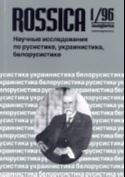
We kindly inform you that, as long as the subject affiliation of our 300.000+ articles is in progress, you might get unsufficient or no results on your third level or second level search. In this case, please broaden your search criteria.

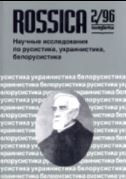
Украинцы попали в Болгарию, преимущественно, на гребне двух волн эмиграции. Одни нашли приют на земле братского славянского народа еще до Октябрьской революции. Другие очутились тут в поисках 'лучшей судьбы", убегая от голода и невзгод, остальные - спасаясь от преследования царских властей за свои воззрения, в том числе за осуждение колониальной политики царизма относительно Украины. Следующий прилив украинцев стал последствием первой мировой войны и Октябрьской революции. В Болгарию - союзницу Германии и Австро-Венгрии, было переправлено из этих стран свыше 5 тыс. военнопленных. Гражданская война выбросила за пределы Украины как мирных граждан, не поддержавших большевиков, так и остатки разбитых ими армий Деникина и Врангеля, в составе которых было много украинцев. И первые, и вторые нашли пристанище в соседних государствах, в том числе и в Болгарии.
More...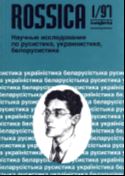
Русское историческое общество (РИО) в Праге организовано в 1925 г.; оно объединило российских историков-эмигрантов разных поколений. Возглавил Общество Е. Ф. Шмурло. РИО ставило своей задачей объективное осмысление исторических событий прошлого, исключая из рассмотрения текущие или недавние политические события. Общество не было чисто историческим: по составу членов и изучаемой проблематике оно носило скорее комплексный характер, включая специалистов и по истории права, церкви, литературы, искусства, языка, философии и др. Основная форма работы РИО - научные доклады на заседаниях Общества. Значительная их часть в виде статей или тезисов публиковалась в „Записках" РИО В 1940 г. РИО присоединилось к Русскому свободному университету (РСУ) в Праге, закрытому немцами в 1944 г. и окончательно исключенному из списков научных обществ Министерством внутренних дел Чехословакии в 1949 г.
More...
Комитет по, увековечению -памяти Александра Александровича Блока обращается с призывом ко всем лицам, ,у которых находятся рукописи и письма Александра Александровича, а также все материалы, относящиеся к его жизни и творчеству (воспоминания, заметки, письма к нему или о нем, снимки и т: п.) предоставить эти материалы в подлинниках или точных копиях в распоряжение Комитета.
More...
"Annals of the House of Writers", How do writers live in the Crimea
More...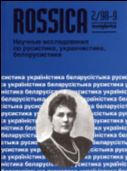
В последнее время научные учреждения русской эмиграции в межвоенной Чехословакии стали предметом пристального внимания исследователей. Несколько работ в той или иной степени освещают и деятельность Русского народного (позднее - свободного) университета в Праге, как правило, ограничиваясь 1938 годом. В фонде РСУ в Государственном архиве Российской Федерации (ГАРФ) большинство документов также относятся к 1920-1930-м годам. В книге В. Т. Пашуто лишь кратко упоминается о дальнейшем существовании университета. Изучая личные фонды русских эмигрантов в Архиве Академии наук (А. В. Флоровский) и в ГАРФ (П. А. Остроухов, М. М. Новиков, А. Н. Фатеев др.), авторам настоящей статьи удалось обнаружить немало сведений об истории РСУ в годы Второй мировой войны, когда он назывался Русской ученой академией. Именно этот последний период его деятельности вплоть до закрытия в послевоенные годы будет предметом рассмотрения данной статьи.
More...
Среди русской интеллигенции, эмигрировавшей после революции из России и нашедшей пристанище в Чехословакии, видное место занимает известный в то время писатель Евгений Николаевич Чириков. В последнее время из сохранившихся архивных материалов публиковались лишь воспоминания писателя (Е. Н. Ч ирико в . На путях жизни и творчества. Отрывки воспоминаний. In: „Лица.“ Биографический альманах. Вып. 3. „Феникс: Atheneum“ М. - СПБ., 1993), а также отдельные выдержки из его эпистолярного наследия и воспоминания членов семьи, связанные с именами М. И. Цветаевой, И. Я. Билибина и др. В данной публикации представлена выборочная подборка писем 1920-1922 гг., которая освещает некоторые подробности послереволюционной жизни и эмиграции из России семьи писателя. Оригиналы этих писем находятся в семейном архиве, который хранится в данное время в Минске у внука писателя Е. Е. Чирикова.
More...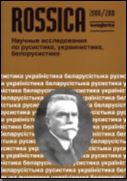
The youngest of the Young Czech deputies elected in 1891 to the Austrian Reichsrat was Karel Kramař. A confirmed Slavic enthusiast since his youth, he became the most influential figure in Czech political Slavism in the two decades before World War I. In the late eighties and early nineties, when Kramař was a political neophyte, his Slavism assumed a rather complex and pragmatic form. It blended Czech patriotism and panslav feeling with a high regard for Russia, but avoided blind russophilism and did not counterpose Russia to Austria as a rival center for Slavic allegiance. Kramař hoped that the Austrian half of the Habsburg monarchy would be restructured along federal lines, with self-government for the Czechs on a par with Hungary; later he broadened this concept to include autonomy for the other nationalities of Austria. So far as the Hungarian half was concerned, Kramař acknowledged “sympathy” for the Slovaks but did not envision ending Hungarian domination through a federal reorganization similar to that which he wanted in Austria. He proposed to reach his goal through a Slavic policy employing both moderate and militant tactics: moderate through the formation of a “Slavic club” in parliament that would reform Austrian internal conditions by means of legislation, and militant though open agitation in behalf of all- Slavic cooperation, stressing “as a last resort,” should conventional methods fail, “an entirely panslavic anti-Austrian opposition.” Kramař did not restrict his Slavic policy merely to securing Czech autonomy or solving purely Austrian problems; however, his obviously austroslav predilections made him a target for attacks from the russophils on the Young Czech newspaper Narodni listy and the eccentric Young Czech deputy Jan Vašaty. Kramař exemplified new qualities among liberal partisans of Czech Slavism: knowledge, restraint, and political adeptness. This was partly a product of his cosmopolitan education, including university study in Prague, France, and Germany, and of his wide travel throughout Europe. From his father, a one-time farmer turned building contractor and an ardent Young Czech, he received not only enough money for a comfortable life style but also love of the Bohemian landscape and of Czech national traditions, and loyalty to the Young Czech party.
More...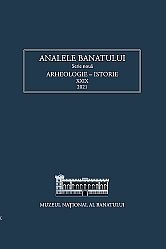
This article illustrates the activity of the architect and painter Albert Krausz (1892-1958), who designed in Timișoara dozens of villas and blockhouses in the modernist style in the 1930s, being the author of an important number of portraits and landscapes preserved nowadays in museums and private collections in Romania, Germany, and Israel, or only mentioned or reproduced in newspapers and magazines during the interwar period. Two museums in Timișoara preserve the memory of this highly sought-after portraitist between the two World Wars for the bourgeoisie and the intellectuals of the city on the Bega river: writers, painters, journalists, photographers, politicians, industrialists, merchants and lawyers, thus creating an illustrated lexicon of the representatives of the various cultural-linguistic communities, who contributed to the creation of the multicultural spirit of the city of Timișoara/Temesvár (Hungarian)/Temeschburg (German)/Temišvar (Serbian). Various memorial sources testimony the presence of Albert Krausz in the cultural and artistic circles of the interwar Timișoara, whitin the houses of dr. Moritz and Bianka Schönberger, Else Kornis, Ervin and Raimunda Beatrix Salló, and Olga Szuits.
More...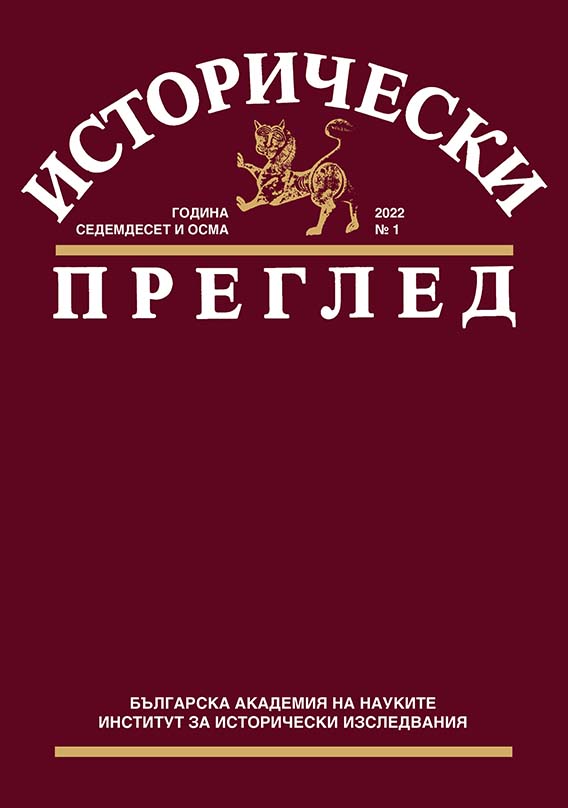
Readers of the Historical Review are offered some of the memoirs of renowned Serbian journalist and politician Milan Jovanovic-Stoimirovic about relations between Belgrade and Sofia after the First World War. Special attention is paid to the idea of unification between the Kingdom of Serbs, Croats and Slovenes and the Kingdom of Bulgaria / the so-called Integral Yugoslavia / and their transformation into a large South Slavic state. Jovanovic-Stoimirovic’s activities in Skopje in the first half of the 1930s will also be of interest, as he was sent there to organize and lead the propaganda activities of the central government in Belgrade in Vardar Macedonia. The memoirs contain important and curious information about the mood among the ruling circles in the Kingdom of Serbs, Croats and Slovenes towards Bulgaria and Bulgarian politicians, the attitude of the Bulgarian Prime Minister Alexander Stamboliiski to the idea of “Integral Yugoslavia” in particular and Serbia in general. , the reaction of the ruling party and the opposition in Belgrade to the coup of June 9, 1923 and the overthrow of A. Stamboliiski from power, the situation in Vardar Macedonia in the 1930s and others. The publication also contains a short biographical sketch of Milan Jovanovic- Stoimirovic related to the political development of Yugoslavia in the first half of the twentieth century.
More...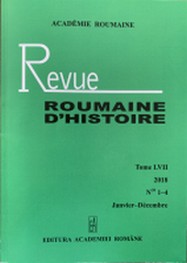
The present study, based on an original archival material preserved in Rome at the Accademia di San Luca, intends to bring new data on aspects of institutional evolution and, especially, related to internal life and relations within the scholarship community of the Romanian School in Rome, an institution created after the Great Union of 1918 and opened in November 1922 in the wake of the cultural policy supported by Greater Romania to strengthen relations with Italy. The work focuses on the correspondence of the first generation architect scholarship holders specializing in the Italian capital, Horia Teodoru and Ion Anton Popescu – interested in the techniques of restoration of the historical monuments –, with the Italian archaeologist and topographer Giuseppe Lugli (1890-1967), corresponding member of the Romanian Academy and scientific secretary of the Romanian School in Rome. The correspondence, spread over decades (1920s-1960s), provides information on the scientific interests of the Romanian scholars, whose works developed during the Roman internship have so far remained reference points in the historiography of the problem, as well as data on the mechanism of scholarships’ distribution, to the internal life of the Institute, to the relations of professor Lugli with the Romanian academic environment, the main objective being to restore a complete fresco on the evolution of the Romanian School in Rome at the centenary, the institution representing a nodal point of the Romanian-Italian cultural relations during the interwar period and a pivot of post-war cultural diplomacy from the perspective of bilateral relations.
More...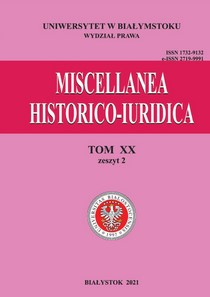
The Kingdom of Serbs, Croats, and Slovenes was created on December 1, 1918 by proclamation of Regent Alexander I Karadjordjevic. The most important step regarding the organization of the newly formed state was the adoption of the constitution. The first constitution of the newly formed state was adopted on June 28, 1921, and in science it is usually called the Vidovdan Constitution. Due to a series of internal problems, on January 6, 1929, the king suspended the Vidovdan Constitution, dissolved the assembly and banned the work of political parties, and justified the coup by the highest national and state interests. The transition to an open dictatorship did not solve any of the political, economic, or national problems that led to the crisis. Despite the fact that the king announced his return to the constitutional order as soon as possible, this would happen only after two years. With the enactment of the constitution on September 3, 1931, there was no democratization of Yugoslav society, but the king’s open dictatorship was replaced by a constitutional one. The existence of the Kingdom of Serbs, Croats, and Slovenes/Yugoslavia in the period 1918–1941 in a political sense, was marked by the changes of a covert and open dictatorship, whereby the proclaimed democratic rights and freedoms represented only a show for the public. Through the paper, the author will analyze those constitutional provisions and the king’s actions that indicate this.
More...
The principle “nullum crimen, nulla poena sine lege” is one of the core principles of German criminal law and constitutional law. However, the history of this principle is quite varied. This article will focus on an essential part of this history, namely on the version of this principle in the Weimar Constitution of 1919. It will be shown that the principle of legality of criminal law was indeed expressed in that constitution, but that the exact scope of application of this constitutional principle was quite unclear. In this regard, it was uncertain whether the Weimar Constitution also prohibited the retroactive application of criminal laws to those cases for which a more lenient penalty was provided at the time of the offense. This ambiguity of the Weimar Constitution finally became apparent in 1933 in the so-called Reichstagsbrandprozess (Reichstag fire trial). The issue in these criminal proceedings was whether the burning of the parliament building in Berlin (February 27, 1933) was punishable by death, although this sanction was not provided at the time the crime was committed. In this essay, it will be shown that the National Socialists had to go to considerable effort to be able to ignore prohibitions on retroactivity. This undermining of the principle “nullum crimen, nulla poena sine lege” forms an important example of the willingness of the legislature to negate essential protective principles of law in the Third Reich.
More...
The economic and social provisions of the Vidovdan constitution represent its most advanced part. Its introduction was a step forward towards the creation of a socially responsible state. However, their basic goal, increasing the cultural and economic well-being of the people, was not achieved and the economic crisis deepened. In the post-war state, burdened with cultural, religious, and national differences, the democratic constitution did not last long. The author tries to explain the factors that influenced the adoption of these provisions and their (non) implementation. Whether the failure of economic and social provisions was determined by the fate of the constitution or by objective facts is difficult to say. The author seeks to prove that the collapse of the constitution and its economic and social provisions was influenced by a number of unfavorable circumstances, such as the economic underdevelopment of the state, the remnants of feudal relations, political disunity, resistance to the new state, and Serbian hegemony. Using the historical-legal method of research, combined with economic and sociological methods, the socio-economic provisions of the Vidovdan Constitution and their implementation will be analyzed.
More...
The changes that took place at the end of the First World War significantly affected all spheres of society: economic, political relations, ideology, and culture. They took place in almost every state and, despite the differences in their course, had one thing in common: the desire of political elites to achieve stability as soon as possible. The democratic and liberal methods of governance that governments tried to use to meet this challenge proved ineffective. As a result, totalitarian and authoritarian sentiments intensified in political thought at the time. They manifested themselves in a search for new concepts of state systems that would guarantee rapid success in carrying out reforms and ensure the proper functioning of the entire state apparatus for the benefit of society. The most suitable ground for their establishment and implementation was in those European states that had lost the war or failed to overcome economic recession and political instability. Having restored its statehood in 1917–1920, Ukraine then lost it. Among its political elites, active debate erupted over the question of who was to blame. Leaders of the Ukrainian People’s Republic were severely criticized by rightwing circles, who accused them of making the democratic republic model of the state unviable, which resulted in the loss of national independence. As an alternative, they formulated their own vision of the future Ukrainian state that included totalitarian or authoritarian models of government, which were bring established in a number of European countries and proved effective in neutralizing the communist movement, strengthening the state apparatus and playing the part of main arbiter in the life of society. Theoretical substantiations of these concepts were reflected in the works of right-wing radical and conservative politicians – Dontsov, Stsiborsky, Lypynsky, Kuchabsky, and Nazaruk. The model of the Ukrainian state in the vision of the rightwing political circles of the interwar period generally reflected the tendencies of European political ideas at that time, with the difference that the issue of restoring its independence remained a priority.
More...
Review of: A. Olechno, Ewolucja konstytucyjnych podstaw systemu rządów Ukrainy [Evolution of the Constitutional Foundations of the Government System of Ukraine], Białystok 2019, 290 pages
More...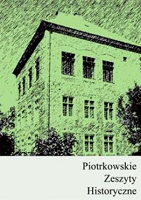
The article presents various forms of repression against villagers in the Kreishauptmannschaft Busko (Radom district). The inhabitants of the village suffered significant personal losses during World War II. The starting point is the description of the crimes committed by Wehrmacht soldiers in September 1939 on the inhabitants of villages in the pre-war Stopnica poviat. The author of this article devoted a lot of attention to the German repressions for failure to deliver regular deliveries of agricultural products. Other forms of German repressions were also discussed: the deportation of villagers to forced labor in the Third Reich, as well as repressions for helping Jews.
More...
The article describes the figure of Colonel Michael Zdzichowski (1884- 1962). From 1905 he served in the Russian army, and took part in the fighting on the Russian-German front during World War I. In 1918 he returned to Poland, where – as a volunteer – he joined the Polish Army. Initially, he was assigned to the 1st Marine Battalion, and in 1920 to the Central Camp of NCOs for Artillery Schools in Toruń – in the summer of the same year he took part of 1920 in the Polish-Russian war in northern Mazovia. Then he worked for five years at the artillery school in Toruń. He was very well assessed by his superiors as an outstanding artillery officer. In 1926 he was transferred to the 8th Heavy Artillery Regiment, where he took the position of deputy regiment commander. Half a year later he took command of the 10th Light Artillery Regiment in Lodz and commanded it for eight years. In 1934, he was retired and settled in Lublin. Here he began to develop his interests and painted oil paintings. In September 1939, he was appointed commander of the Light Artillery Reserve Center No. 9. During the German occupation, he and his wife participated in secret teaching. After World War II, in August 1945, he volunteered for the so-called Polish People’s Army and despite 61 years of age – he was assigned to the Officer Artillery School in Chełm (later the school was transferred first to Olsztyn, and then to Toruń). At the turn of 1949 and 1950, he was retired for the second time. For the following years he lived in Toruń, where he died in 1962.
More...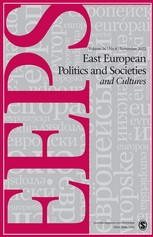
The article explores the process of legal and judicial integration of Transylvania within Greater Romania, focusing on how Romanian legal professionals experienced the transition from the Habsburg Empire to the Romanian nation-state. I argue that lawyers, judges, and jurists placed greater importance on legal tradition, professional solidarity, and the pursuit of personal interests than nationalism. Building on Pierre Bourdieu’s notion of the juridical field, the article investigates how the traditions and categories of judgment typical of legal professionals often hampered the nationalization projects undertaken by the Romanian government, thereby casting new light on the process of Romanian state building in the early 1920s. Furthermore, the present piece addresses the issue of the imperial legacy, exploring the relationship between new and old laws and the reasons behind the former legislative structure surviving the political upheaval of 1918.
More...
The text attempts to explain Silesian behaviour which results from the cultural dominance of the Polish state. Postcolonial theory facilitates the understanding of Silesian aspirations to emphasise differences from the Polish past and to display the harm they have suffered. The analysis is based on disputable interpretations of events such as the Silesian Uprisings (during 1919–1921) and World War II. The narrative around these differs, an example of invented tradition in both groups: dominant and dominated. Meanwhile, the lack of recognition of the historical and cultural distinctiveness of the region is a source of conflict.
More...